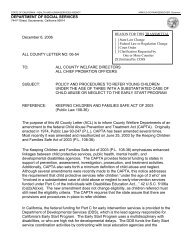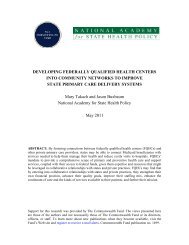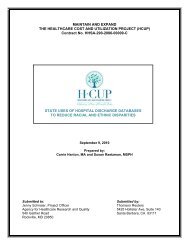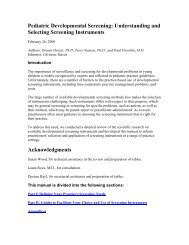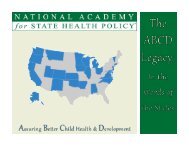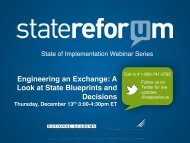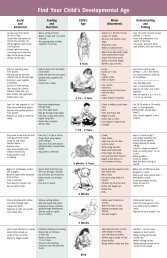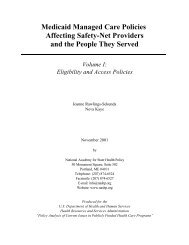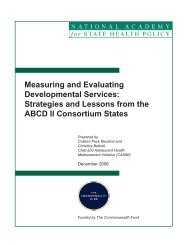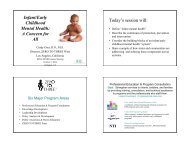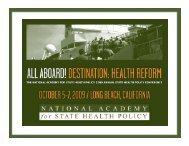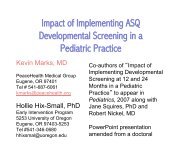Improving Care Coordination, Case Management, and Linkages to
Improving Care Coordination, Case Management, and Linkages to
Improving Care Coordination, Case Management, and Linkages to
You also want an ePaper? Increase the reach of your titles
YUMPU automatically turns print PDFs into web optimized ePapers that Google loves.
22<br />
Illinois has taken the medical home <strong>and</strong> PCCM approaches <strong>to</strong> a different level in a program called “Health<br />
Connect.” 53 Illinois is enrolling all children with publicly-subsidized health coverage (including Medicaid,<br />
SCHIP, <strong>and</strong> others in the state’s All Kids plan) in<strong>to</strong> the PCCM program – this includes 1.5 million children<br />
plus 300,000 adults, with a few special populations exempted. More than 5,000 PCCM medical homes—<br />
with a capacity <strong>to</strong> serve over 5 million adults <strong>and</strong> children—have been enrolled. Providers receive $2 per<br />
child per month as a PCCM fee, over <strong>and</strong> above payments for medical care services. Each medical home<br />
provider must agree <strong>to</strong> provide prompt medically necessary care with a focus on the provision of quality<br />
primary <strong>and</strong> preventive health care services that support continuity of care initiatives <strong>and</strong> avoid unnecessary<br />
emergency room visits <strong>and</strong> hospitalizations. The supportive CC/CM services include: making medically<br />
necessary referrals, scheduling diagnostic consultation <strong>and</strong> specialty visits, communicating with other case<br />
managers, <strong>and</strong> providing families direct access 24 hours a day through an answering service/paging mechanism<br />
or other approved arrangement for coverage 24 hours, seven days a week. Illinois’ ABCD II efforts are<br />
being continued through the Enhancing Developmentally Oriented Primary <strong>Care</strong> (EDOPC) project. 54<br />
Contract provisions between Medicaid agencies <strong>and</strong> primary care providers have been used in other states<br />
<strong>to</strong> define the role of the medical home. For example:<br />
• In North Carolina, the PCPs’ role is described as: “The ongoing responsibility for directly providing<br />
medical care (including diagnosis <strong>and</strong>/or treatment) <strong>to</strong> an enrollee regardless of the presence or absence<br />
of disease. It includes health promotion, identification of individuals at special risk, early detection of<br />
serious disease, management of acute emergencies, rendering continuous care <strong>to</strong> chronically ill patients,<br />
<strong>and</strong> referring the enrollee <strong>to</strong> another provider when necessary.” 55<br />
• In Alabama PCCM providers are responsible for “provision of integrated, accessible health care services<br />
by clinicians who are accountable for addressing a large majority of personal health care needs, developing<br />
a sustained partnership with patients, <strong>and</strong> practicing in the context of family <strong>and</strong> community.” 56<br />
Child health <strong>and</strong> EPSDT care coordination staff<br />
Some states have hired local EPSDT coordina<strong>to</strong>rs, who have the time, capacity, <strong>and</strong> capability <strong>to</strong> assist providers<br />
in making referrals <strong>to</strong> community services. Typically EPSDT coordina<strong>to</strong>rs are public health nurses or<br />
social workers employed by a local health department or another local agency. States extensively using this<br />
approach include Colorado, Iowa, Minnesota, <strong>and</strong> Maine. In North Carolina, child service coordina<strong>to</strong>rs play a<br />
similar role.<br />
In Iowa, the EPSDT program is known as <strong>Care</strong> for Kids, <strong>and</strong> at least one EPSDT <strong>Care</strong> Coordina<strong>to</strong>r is available<br />
in every county. The Department of Human Services (DHS) is the administrative agency for the EPSDT <strong>Care</strong><br />
for Kids program. Through a formal written agreement, DHS engages the Iowa Department of Public Health<br />
<strong>to</strong> provide EPSDT eligible children with information <strong>and</strong> care coordination services. This agreement supports<br />
information exchange <strong>and</strong> financing arrangements. The State public health/Title V agency, in turn, fulfills<br />
the responsibilities of this agreement by contracting with local Title V agencies <strong>to</strong> work with families in their<br />
respective service areas. EPSDT care coordina<strong>to</strong>rs inform families about the importance of EPSDT services<br />
<strong>and</strong> preventive care, remind families when EPSDT periodic visits are due, assist health care providers in making<br />
referrals for additional developmental screening or other intervention services, help connect families <strong>to</strong><br />
providers when a referral is made, link families <strong>to</strong> community resources (including transla<strong>to</strong>rs <strong>and</strong> child care),<br />
arrange transportation <strong>to</strong> medical <strong>and</strong> dental visits, <strong>and</strong> assist families in overcoming barriers as they negotiate<br />
the health care system. <strong>Care</strong> coordina<strong>to</strong>rs are registered nurses, registered dental hygienists, <strong>and</strong>/or<br />
other professionals with a Bachelor’s degree in health education, social work, counseling, psychology, <strong>and</strong> so<br />
forth. 57 The state has used its ABCD project <strong>to</strong> further enhance the role of these care coordina<strong>to</strong>rs.<br />
<strong>Improving</strong> <strong>Care</strong> <strong>Coordination</strong>, <strong>Case</strong> <strong>Management</strong>, <strong>and</strong> <strong>Linkages</strong> <strong>to</strong> Service for Young Children: Opportunities for States<br />
National Academy for State Health Policy



